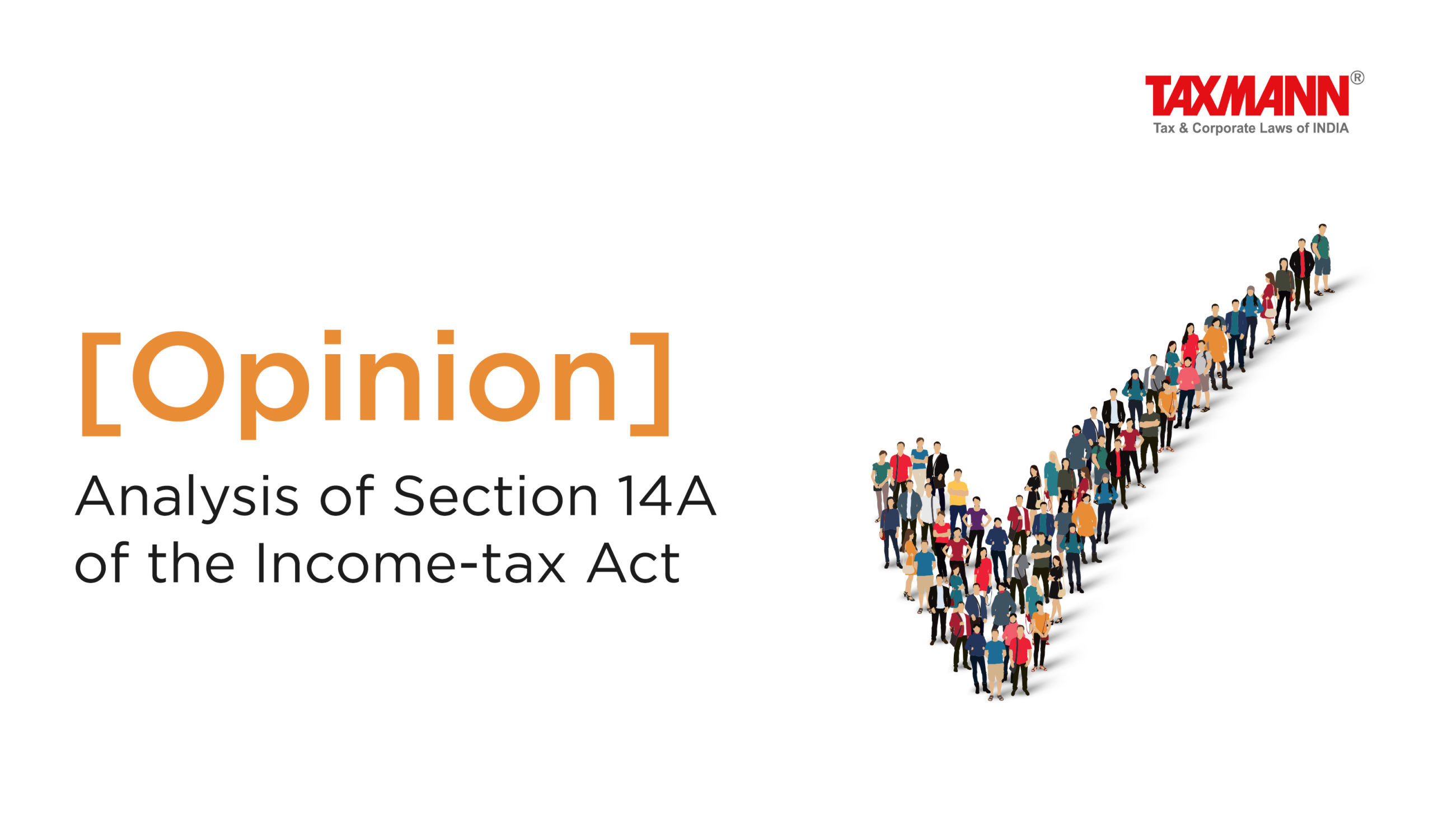[Opinion] Analysis of Section 14A of the Income-tax Act
- Blog|News|Income Tax|
- 3 Min Read
- By Taxmann
- |
- Last Updated on 4 August, 2023

Adv. D.C. Agrawal & CA Manav Prem – [2023] 153 taxmann.com 2 (Article)
1. Introduction
Section 14A was inserted by Finance Act, 2001, w.r.e.f. 1-4-1962. It provided that no deduction shall be made in respective of expenditure incurred in relation to income which does not form part of the total income under the Act. The Board’s Circular No. 13 dated 12-12-2001 explained the scope and effect of this section. It was clarified that the assessments where the proceedings are become final before 01-04-2001 shall not be reopened u/s 147 to disallow such expenditure. By Finance Act 2006 w.e.f. 01-04-2007 sub-section (2) and (3) were inserted to provide that amount to be disallowed u/s 14A will be calculated in accordance with the method prescribed. Such method will be followed only when AO is not satisfied with the correctness of the claim of the assessee in respect of the expenditure in relation to income which does not form part of the income. The method prescribed would also be followed where assessee claimed that no expenditure has been incurred by him in relation to exempted income. In order to avoid controversy between section 14A and other provisions of the Act according to which an expenditure is allowable even in respect of exempted income, amendment was made by Finance Act 2022 w.e.f. 01-04-2022 by substituting the expression “for the purposes of” with the expression “Notwithstanding anything to the contrary contained in this Act, for the purposes of”. Finance Act 2022 also inserted an Explanation in section 14A to provide that expenditure incurred in relation to an exempted income which has neither accrued nor arisen during the current year shall also be considered for disallowance under this section. The method for computation of disallowable expenditure under this section is prescribed in rule 8D.
2. Rule 8D
Rule 8D provided that where the AO having regard to the accounts of the assessee of a previous year is not satisfied with the correctness of the claim of the expenditure made by the assessee or with his claim that no expenditure has been incurred by him in relation to such income not forming part of the total income, the disallowable expenditure shall be computed in accordance with sub-rule (2). Sub-Rule (2) provided that the disallowable expenditure shall comprise of two parts. The first part is the amount of expenditure directly relating to income which does not form part of the total income and second part is an amount equal to 1% of the annual average of the monthly averages of the opening and closing balances of the value of investment which does not or shall not form part of the total income. A capping has been provided to the effect that disallowable expenditure calculated under rule 8D(2) shall not exceed total expenditure claimed by the assessee. Thus, in a case where rule 8D has to be invoked, the assessee has
(i) to identify investments, income from which do not form part of the total income
(ii) to work out monthly averages of opening and closing balances of such investments
(iii) to work out annual average of such monthly averages
(iv) take 1% of such annual average as disallowable expenditure and
(v) restrict the disallowable expenditure to the total expenditure claimed in respect of such investments.
Rule 8D was inserted w.e.f. AY 2008-09 and therefore, was not applicable for earlier assessment years.
Click Here To Read The Full Article
Disclaimer: The content/information published on the website is only for general information of the user and shall not be construed as legal advice. While the Taxmann has exercised reasonable efforts to ensure the veracity of information/content published, Taxmann shall be under no liability in any manner whatsoever for incorrect information, if any.

Taxmann Publications has a dedicated in-house Research & Editorial Team. This team consists of a team of Chartered Accountants, Company Secretaries, and Lawyers. This team works under the guidance and supervision of editor-in-chief Mr Rakesh Bhargava.
The Research and Editorial Team is responsible for developing reliable and accurate content for the readers. The team follows the six-sigma approach to achieve the benchmark of zero error in its publications and research platforms. The team ensures that the following publication guidelines are thoroughly followed while developing the content:
- The statutory material is obtained only from the authorized and reliable sources
- All the latest developments in the judicial and legislative fields are covered
- Prepare the analytical write-ups on current, controversial, and important issues to help the readers to understand the concept and its implications
- Every content published by Taxmann is complete, accurate and lucid
- All evidence-based statements are supported with proper reference to Section, Circular No., Notification No. or citations
- The golden rules of grammar, style and consistency are thoroughly followed
- Font and size that’s easy to read and remain consistent across all imprint and digital publications are applied



 CA | CS | CMA
CA | CS | CMA
